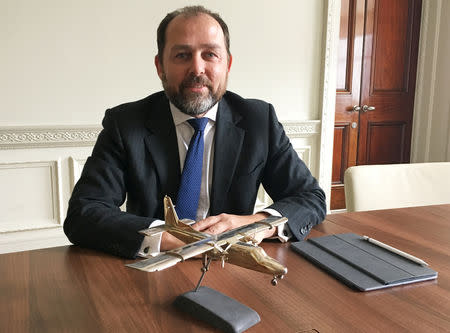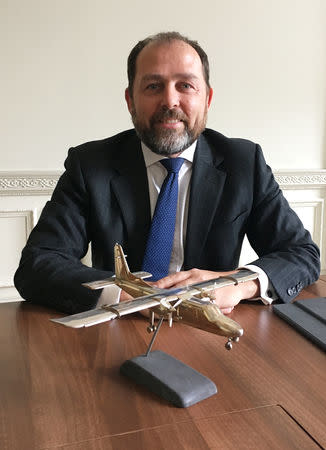Bemoaning UK handling of Brexit, a pro-Leave planemaker looks to EU, U.S.
By Sarah Young
LONDON (Reuters) - One of Brexit's most fervent supporters, the planemaker Britten-Norman, is now complaining about Britain's handling of its planned exit from the European Union and is considering moving some functions into the EU or to the United States.
The CEO of the privately owned firm, which builds the 10-seater Islander aircraft, a stalwart of Caribbean island hopping, said whatever happens the company will remain largely British-based. But lack of clarity over the future relationship with the EU has forced it into an uncomfortable position.
"What we have is assurances from the UK government that nothing is going to change after March next year ... but in terms of trying to bank on that, I can't bank on that," William Hynett, who has run the London-headquartered company for 15 years, said in an interview.
"There would be those there who are probably unkind enough to say, well, you wanted this outcome, so tough luck," he said.
The company did ask for it: a Britten-Norman plane flew around Britain towing a "Vote Leave" banner in the weeks before the June 2016 referendum.
One of its flights took it over a memorial service for Jo Cox, an anti-Brexit member of parliament murdered by a Brexit supporter. The company said it hadn't known about the service and apologised for flying over it.
But Hynett does not apologise for the stance it took. "Our position on Brexit hasn't changed," he said.
He blames lack of planning and clarity from the government for forcing Britten-Norman to be ready to shift some of its functions away from the UK.
Britain is due to leave the EU on March 29, 2019. What sort of relationship the two will have after that has yet to be determined.
Most other aerospace companies have warned the uncertainty around Brexit threatens their businesses. Aerospace giant Airbus <AIR.PA>, the European planemaker which makes the wings for all its passenger jets in Britain, has warned about the risk to jobs and investment.
Rolls-Royce <RR.L> has laid out contingency plans to move a design-approval process for its large jet engines from Britain to Germany, and to stockpile parts.
But for smaller operator Britten-Norman -- Britain's only independent commercial planemaker, with 150 employees and 15 million pounds of annual turnover -- Hynett believes complying with costly EU regulations outweighs any benefits from being in a trading bloc where few of its customers are located.
Britten-Norman, whose owners include Oman's Zawawi family as well as Hynett, has been making its Islander aircraft, a specialist at taking off and landing on unprepared surfaces, since 1965. Over 1,300 have been produced; current output is one Islander or Defender plane, its other model, per quarter, with some parts made by a sub-contractor in Romania.
Under consideration as part of the company's Brexit contingency plans is the possibility of shifting the "type certificate", a required airworthiness credential, from being certified by the European safety regulator EASA to the U.S. regulator, the Federal Aviation Agency.
Another is establishing the type certificate in a European country, should Britain be excluded from EASA after Brexit, and not have its own certifying procedure set up.
"Whether we use European conduits or partial migration to America or anything else as part of our future strategy in order to mitigate some of these risks, absolutely, we'll do what we have to," he said. He declined to name the European country he had in mind.
(Reporting by Sarah Young, editing by Larry King)

 Yahoo News
Yahoo News 

